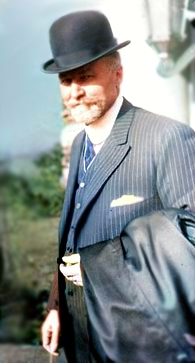
Dr. John B. Murphy, known throughout his life as “J.B.,” was a renowned American surgeon and medical pioneer who made significant contributions to the field of medicine during his lifetime. He was born in a log cabin in Appleton, Wisconsin, on December 21, 1857. Murphy was the son of impoverished Irish immigrants Michael Murphy and Ann (née Grimes) Murphy, who had emigrated from Ireland during the Great Hunger. Murphy grew up in a large family with six siblings. His parents strongly emphasized education and encouraged their children to pursue academic and professional success.
Murphy often quoted his mother: “If you are educated, there is no man’s achievements which you cannot equal or excel, provided you have industry, integrity, and are temperate.” Murphy’s parents also instilled in their son a strong Catholic faith which he carried throughout his life.
Murphy was introduced to the idea of a medical career while working as an assistant to the local druggist, sweeping out the store, running errands, and filling prescriptions for the local physician, Dr. H. W. Reilly. One day, Dr. Reilly needed JB’s help to resuscitate a man bleeding from an extensive injury to his leg. The young Murphy, fascinated and unperturbed by the sight of the horrific injury, decided to become a doctor. JB saved money to become the doctor’s trainee and assistant. He slept in the office, kept it clean, accompanied the doctor on calls, and studied in his spare time, while paying the doctor a $200 honorarium.
After a year, Dr. Reilly told Murphy he had nothing more to teach him and that he should attend medical school. At the age of twenty, Murphy was admitted to Chicago’s Rush Medical College. Murphy graduated in 1879 and, unusually for the time, pursued an 18-month internship at Cook County Hospital in Chicago, placing first in their placement examination. Upon graduation and briefly practicing medicine, Murphy began a tour of Europe, where he studied under some of the prominent surgeons of the time.

Murphy returned to Chicago and the United States. Unafraid of controversy, he drew the ire of the established medical establishment when he pushed for the early removal of the appendix in cases of appendicitis (the accepted practice at the time was to wait until the appendix ruptured), developing a new and less invasive process to perform the operation. He gained national attention as one of the doctors to attend to the injured from Chicago’s Haymarket riots and later for being the attending physician to former President Theodore Roosevelt after an unsuccessful assassination attempt.
Dr. J.B. Murphy was a medical pioneer. Among his innovations:
- Murphy’s Sign: A diagnostic technique utilized to identify gallbladder disease.
- The Murphy Button: A device designed to close openings in the intestine following surgery, this innovation significantly reduced recovery times and marked a breakthrough improvement over the traditional suture method.
- The Murphy-Davis Splint: Developed by Dr. J.B. Murphy and Dr. Frank Davis, this device was used to immobilize the hip following surgery, representing a significant improvement over existing devices and was widely adopted by surgeons.
- The Murphy Technique: Dr. Murphy performed the first successful removal of the gall bladder using an innovative surgical technique that remains in use today.
- The Murphy Drip: Used for hydration and replenishment of electrolytes.
- The First Use of Rubber Gloves in Surgery: Murphy recognized the importance of sterile technique and began wearing rubber gloves to reduce the risk of infection during surgery.
- The First Use of an X-Ray Machine in Surgery: In 1896, Dr. Murphy became the first surgeon to use an X-ray machine during surgery, quickly locating a bullet in a patient’s abdomen, enabling him to perform surgery without damaging any vital organs.
- Murphy became the first surgeon to successfully resect a major artery in a human being.
.Murphy was recognized not only as an innovative surgeon but also as a great teacher who was quick to pass on his techniques to his colleagues. He founded several medical publications that are still printed today. J.B. Murphy ran teaching clinics four days a week at Mercy Hospital in Chicago. At these clinics, he demonstrated to 150 visitors daily the various approaches to multiple surgical problems
Yet, his brilliance as a doctor never eclipsed the Catholic values that Murphy’s parents had instilled in him as a child. Murphy established several hospitals and clinics throughout his career. He believed that all people, regardless of their economic status and ability to pay, should have access to quality medical care. He worked tirelessly to establish new institutions that provided affordable care to Chicago’s poor and underserved populations. In 1892, with the help of the Alexian Brothers religious order, Murphy established the Alexian Brothers Hospital, which soon established a reputation as a modern and well-equipped medical facility that would provide high-quality care to patients from all walks of life. Murphy was a strong advocate for the importance of accessible healthcare and worked tirelessly to ensure that the hospital remained true to its mission of serving the community’s needs.
After accomplishments that could fill several lifetimes, Murphy fell ill in 1916. A doctor till the end, two days before his death, J.B. Murphy told the attending physician, “I think the autopsy will show plaques in my aorta.” After his death, Murphy’s final diagnosis was proved correct.